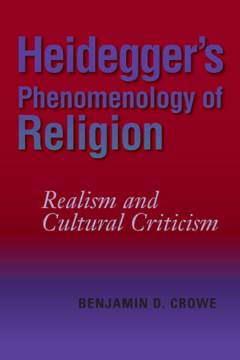Repository | Book

Indiana University Press, Bloomington, Ind.
2007
176 Pages
ISBN 978-0-253-21939-8
Throughout his long and controversial career, Martin Heidegger developed a substantial contribution to the phenomenology of religion. In Heidegger's Phenomenology of Religion, Benjamin D. Crowe examines the key concepts and developmental phases that characterized Heidegger's work. Crowe shows that Heidegger's account of the meaning and structure of religious life belongs to his larger project of exposing and criticizing the fundamental assumptions of late modern culture. He reveals Heidegger as a realist through careful readings of his views on religious attitudesand activities. Crowe challenges interpretations of Heidegger's early efforts in the phenomenology of religion and later writings on religion, including discussions of Greek religion and Hölderlin's poetry. This book is sure to spark discussion and debate as Heidegger's work in religion and the philosophy of religion becomes increasingly important to scholars and beyond.
Publication details
Full citation:
Crowe, B. (2007). Heidegger's phenomenology of religion: realism and cultural criticism, Indiana University Press, Bloomington, Ind.
Table of Contents
This document is unfortunately not available for download at the moment.


